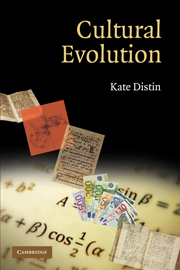Book contents
- Frontmatter
- Contents
- Cultural Evolution
- 1 Introduction
- PART I THE INHERITANCE OF CULTURAL INFORMATION
- PART II THE INHERITANCE OF CULTURAL INFORMATION
- PART III THE INHERITANCE OF CULTURAL INFORMATION
- PART IV THE RECEIVERS OF CULTURAL INFORMATION
- PART V THE EXPRESSION OF CULTURAL INFORMATION
- 14 Conclusion
- Appendix
- Acknowledgements
- Bibliography
- Index
14 - Conclusion
A Representational Understanding of Cultural Evolution
Published online by Cambridge University Press: 05 June 2012
- Frontmatter
- Contents
- Cultural Evolution
- 1 Introduction
- PART I THE INHERITANCE OF CULTURAL INFORMATION
- PART II THE INHERITANCE OF CULTURAL INFORMATION
- PART III THE INHERITANCE OF CULTURAL INFORMATION
- PART IV THE RECEIVERS OF CULTURAL INFORMATION
- PART V THE EXPRESSION OF CULTURAL INFORMATION
- 14 Conclusion
- Appendix
- Acknowledgements
- Bibliography
- Index
Summary
Human culture is extraordinarily diverse. Any theory that purports to explain the origin of its variety and complexity must be able to account for all of it, from atheism to zabaglione. Any credible theory of culture's origin will be expected to answer questions about whether animals have culture; about the relationship between human culture and human biology; about the role of language in facilitating human culture. It will need to be able to account for the nature of the changes in human culture over the millennia, for the mechanisms by which its complexity is maintained and transmitted and for the patterns of cultural diversity that have emerged. The explanations that it provides for observed cultural traits like particular artefacts or their features, particular behaviours or their constituents, must be both grounded in the empirical evidence and precise enough to invite challenge and refutation where appropriate. A theory that can provide a glib explanation of any observation that you care to mention has, of course, little chance of providing an adequate explanation of anything. Cultural explanations must grow out of cultural observations, and cultural predictions must be falsifiable.
Cultural Evolution
For the majority of organisms, their behaviour is as automatic a developmental product of their genes as is their physical form. In a large minority of organisms, however, there is an experiential buffer between their genotype and some aspects of their behaviour.
- Type
- Chapter
- Information
- Cultural Evolution , pp. 220 - 230Publisher: Cambridge University PressPrint publication year: 2010



